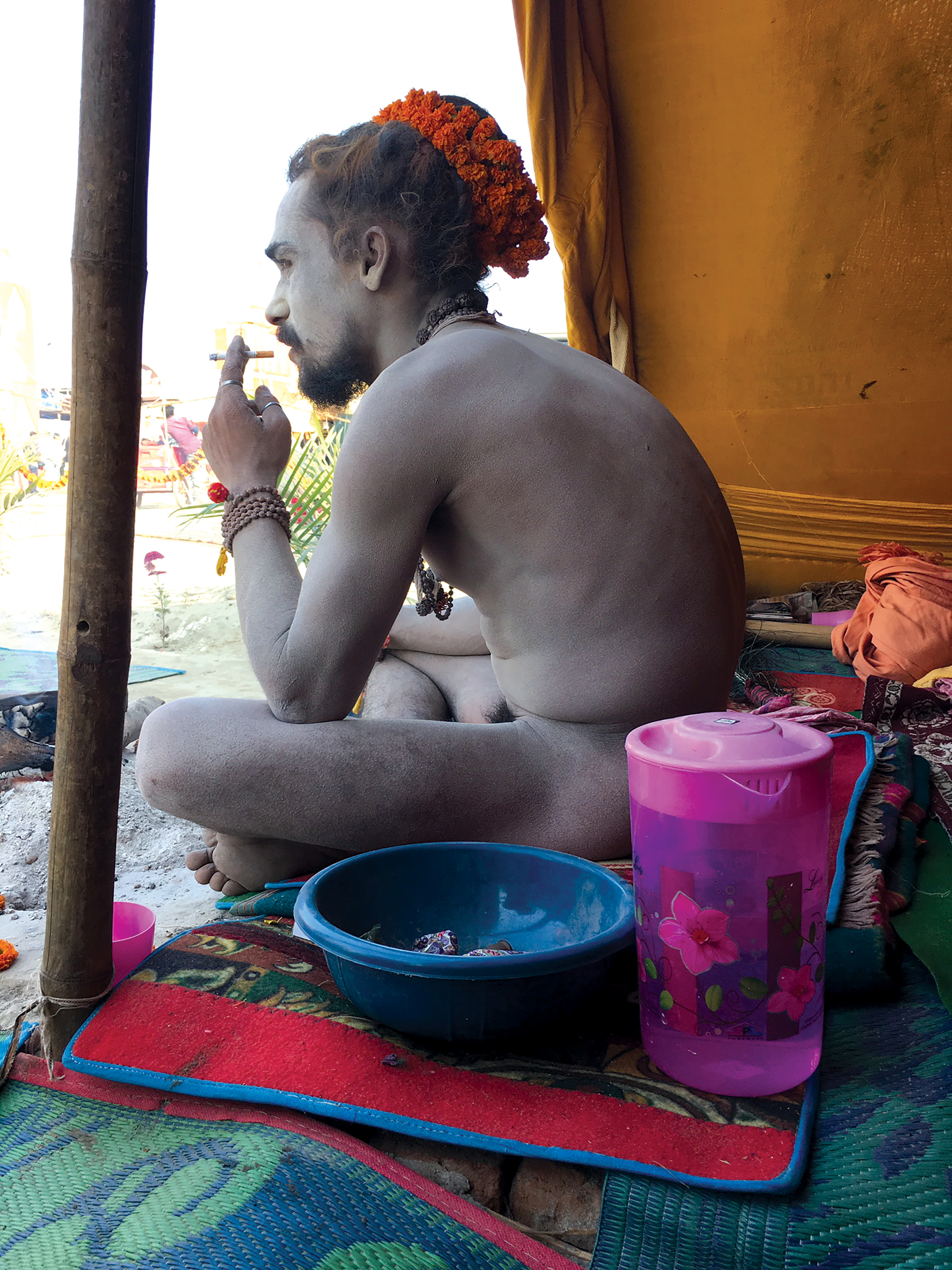The holy Kumbh Mela offers an intense experience, with sages and saints who have relinquished the world — some even clothing — in the quest for freedom from the vicious cycle of birth and death
The Kumbh Mela has its class divide. While the rich get to learn yoga, meditation and have private audience with the enlightened guru; the poor walk miles, braving the biting cold to take a dip in the Ganges.
Achieving divinity is not as easy as shedding clothes and smearing white warm ash on the body, and sitting out naked in the biting cold in the warm presence of a bonfire. Though it has to be said that in its flickering light, the sadhus look surreal. I don’t know about the spiritual attainment for I’m not in a position to arrive at a conclusion. But they say that such experiences can’t be described in words, language fails to capture its nuances and the only way to know is to experience it.
This is no judgement on them and their practices. The fault with lesser mortals like me is that we are habituated to applying logic. Instead of appreciating the subtleties of life from their perspective, we tend to impose our own value system. That could lead to some misunderstanding.
Having made the qualification, it has to be said in this month- long fare — the biggest temporary congregation of humanity for any reason — the power of faith is palpable in the sea of people, meditation, occult, nudity, greed and politics. For three days, I stayed with Naga sadhus—naked saints who smear warm ash on their body— who looked like terracotta statues infused with life.

Nagas are celibate and mostly doped, many of them sniffing serious stuff. They are not bothered about the future and past is past for them, so they live the present moment to the fullest. One thing was clearly evident, in their altered state of perception by spiritual means and also by doping, the reality they experience is very different from mine.
Behind this façade of being a sage, they claim to be the master of the greatest possession — dispossession — yet, they are hopeful that tomorrow will be different from yesterday. Some even plan for a better tomorrow. It all depends on cash reserves, stock of dope and such things that aid their spiritual quest.
Things hardly ever change in their lives. Isolated from family and friends, they are not supposed to create new emotional bonds, other than with fellow sadhus. But the hope lingers, which is heartening and sad at the same time. The older folks are more like administrators, after all they have run a cult that has thousands of members and following of millions requires not just organisation, but well-defined hierarchies.
There are many people, who were never Naga sadhus, but because they are influential and can generate resources, become Mahamandaleshwar (leader of Akhadas). Like the Government of India, Juna Akadha allows lateral entry only to a select few. And saints and sages are looking for some reinforcements from the society, less spiritual, more material: firewood, provisions to eat, oil, dope, blanket or cash. And there’s a dog fight sometimes to woo the finite resources — disciples.
Nagas, in particular, perform manly feats, like pull a car with their genitals. A lot of their ‘super-humanly endeavours’ is a sort of venting of their occult powers. Ironically, they are celibate. Pain, makes a person numb when it goes beyond a certain level, Nagas have crossed that barrier. Display of their ‘super-humanly feat’ gathers a crowd and attracts donations and prospective disciples. On an average, they make about Rs 500 a day.
One of the things that’s admirable is that Nagas are very helpful in guiding lost people in the crowd because they know the area very well.
In this great spiritual congregation of humanity, it’s business time for half of the people seen there. Not just sages and sadhus, but these tribals selling trinkets and stones and a host of petty businessmen selling vegetables, milk and fruit. For those who indulge in dope, Nagas are the best people to source it. They dope with impunity, day and night, even in the presence of law enforcers. Three of the Naga sadhus I interacted with on a regular basis had a ready supply from Nepal.
Here, I felt — and that’s because my spiritual attainment is fairly limited, — people are seeking, even if its spiritual solace, for themselves. It’s a personal pursuit, and therefore a shade selfish. It’s only the poor, who come in large numbers, seek blessings for their family, farm and village at large. The spiritual quest, to a reasonable extent, is guided by market forces.
If one is not part of a cult or an akhada, it’s easier for the rich than the poor to learn yoga, meditation and have private audience with the enlightened sage. There’s a big market of spirituality, but the advantage of being at Kumbh that there are a plethora of options with a large number of buyers and sellers — the conditions are that of ‘perfect competition’. So, don’t be surprised, if you find a client dumping one guru for another with greater promise. Har Har Mahadev!





